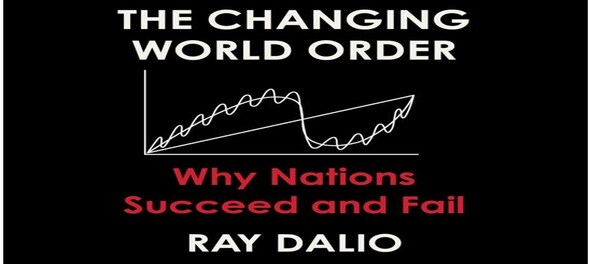
I first heard about Ray Dalio in a Tony Robbins interview. Robbins featured billionaire investor Dalio’s insights in his book Master the Game: 7 Simple Steps to Financial Freedom. Then I read a glowing review about Dalio's own book from Mark Cuban, “How do we learn from history so that we don’t repeat the same mistakes that have led to the downfall of nations?”
All in all, I was terribly curious about Ray Dalio and his writings. Fair warning, ‘Principles for Dealing With the Changing World Order’ is 576 pages long. But Dalio helps us out in the introduction. He says, “ If you want to read the concise version, read what is in bold…. I also wanted to convey some principles that are timeless and universal truths for dealing with reality well, which I denote by • putting a red dot in front of them and italicizing.”
So within the book is a shorter version of the book. Jolly! I’m going to serve you my favourite line from the book out front- “I've come to believe that throughout history there are only a limited number of personality types going down a limited number of paths, which leads them to encounter a limited number of situations to produce a limited number of stories that repeat over time. The only things that change are the clothes the characters are wearing, the language they are speaking, and the technologies they're using.”
Yaay! I love this. Let's dive into some more gems from the book.
1.
The Big Cycle: Dalio says that a very successful empire or dynasty could have its cycle last 200 or 300 years. All the empires and dynasties he studied, rose and declined in a classic Big Cycle that has clear markers. This Big Cycle produces swings between 1) peaceful and prosperous periods of great creativity and productivity that raise living standards a lot and 2) depression, revolution, and war periods when there is a lot of fighting over wealth and power and a lot of destruction of wealth, life, and other things we cherish. I saw that the peaceful/creative periods lasted much longer than the depression/revolution/war periods, typically by a ratio of 5: 1. So one could say that the depression periods were transition periods between the normally peaceful periods.
2. Built to last? The book says, “anyone who studies history can see that no system of government, no economic system, no currency, and no empire lasts forever, yet almost everyone is surprised and ruined when they fail.” Hence, the times ahead will likely be radically different from those we’ve experienced in our lifetimes. This brings me to the related question- how many of us are actually surprised about the Russia-Ukraine war?
3. Betting on the future. Now this is good advice and applies to all. Doctors know how to treat a disease better because they've seen it countless times in the past. Dale says that he wants to understand what is happening well enough to bet on it. In his words, “from my years of wrestling with the markets and trying to come up with principles for doing it well, I've learned that one's ability to anticipate and deal well with the future depends on one's understanding of the cause effect relationships that make things change, and one’s ability to understand these cause effect relationships comes from studying how they have changed in the past.”
4. Dismiss that Myopia: I believe that the reason people typically miss the big moments of evolution coming at them in life is because they experience only tiny pieces of what's happening. We are like ants preoccupied with our jobs of carrying crumbs in our very brief lifetimes instead of having a broader perspective of the big-picture patterns and cycles, the important interrelated things driving them, where we are within the cycles, and what’s likely to transpire.
5. Invest in education: Dalio says, “A nation's level of education affected their levels of productivity, which affected their levels of trade with other countries, which affected the levels of military strength required to protect trade routes, which together affected their currencies and other markets, which affected many other things. Phew! Nothing to contest here. Point well-taken.
Now, it would be an understatement to say that Dalio leads a busy life as head of Bridgewater Associates. So it's quite admirable that he wants to take the time to share his wisdom with the world. He says, “my professional responsibility is to preserve wealth regardless of the environment, I needed to develop an understanding and strategy that would have worked throughout history, including through these sorts of devastating times.”
Reviewers before me have pointed out that some fact-checking is missing from the book. But the arguments he offers are extremely thought-provoking. Time to start reading again.
Reeta Ramamurthy Gupta is a columnist, biographer and bibliophile. She is credited with the internationally acclaimed Red Dot Experiment, a decadal six-nation study on how ‘culture impacts communication.’ Follow her on Twitter: @OfficialReetaRG; Instagram: @officialreetagupta
First Published: Mar 21, 2022 12:37 PM IST
Check out our in-depth Market Coverage, Business News & get real-time Stock Market Updates on CNBC-TV18. Also, Watch our channels CNBC-TV18, CNBC Awaaz and CNBC Bajar Live on-the-go!


Supreme Court says it may consider interim bail for Arvind Kejriwal due to ongoing Lok Sabha polls
May 3, 2024 4:57 PM
10% discount on fare on Mumbai Metro lines 2 and 7A on May 20
May 3, 2024 2:40 PM

